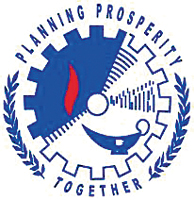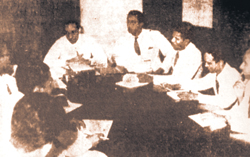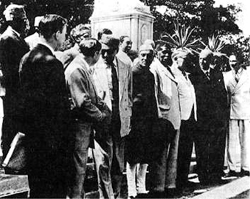 |
| Colombo Plan logo |
Possibly the first international organization to promote economic development among countries was the Colombo Plan – so named because the idea was approved at a meeting held in Colombo in 1950. The Plan was set up a year later in July 1951, 57
years ago.
The first Finance Minister of independent Ceylon (as Sri Lanka was then known),
J. R. Jayewardene (later the country's first Executive President) along with Australia's Foreign Minister Percy Spender were instrumental in proposing such a scheme for mutual help and support among members of the British Commonwealth of Nations.
At the start there were just seven member countries – Australia, Britain, Canada, Ceylon, India, New Zealand and Pakistan. All belonged to the Commonwealth. Today there are 25. They include the Commonwealth countries in the Asia Pacific region and countries belonging to regional groupings such as ASEAN (Association of South-East Asian Nations) and SAARC (South Asian Association for Regional Cooperation).
Attending the Commonwealth Conference on Foreign Affairs (January 1950) when the idea was mooted, were many prominent persons representing their respective countries. They were Percy Spender, Minister for External Affairs, Australia; Ernest Bevin, Foreign Secretary, Britain; Lester Pearson, Minister for External Affairs, Canada; Jawaharlal Nehru, Prime Minister and Minister for External Affairs, India; Fredrick Doidge, Minister for External Affairs, New Zealand; Ghulam Mohammed, Minister of Finance, Pakistan and Ceylon's D.S. Senanayake, Prime Minister and J.R. Jayewardene, Finance Minister.
 |
| One of the originators, Finance Minister J.R. Jayewardene gives C Plan details at a press conference |
The Colombo Plan for Cooperative Economic and Social Development in Asia and the Pacific is a regional inter-governmental organisation to enhance economic and social development of the countries of the region. The Colombo Plan is a partnership concept of self-help and mutual-help in development aimed at socio-economic progress of its member countries.
Originally it was called “ The Colombo Plan for Cooperative Economic Development in South and Southeast Asia.” In 1977, its name was changed to "The Colombo Plan for Cooperative Economic and Social Development in Asia and the Pacific" thus encompassing the extended nature of the organization.
Objectives
The main objectives of the Colombo Plan are:
" To promote interest in and support for the economic and social development of Asia and the Pacific;
" To promote technical cooperation and assist in the sharing and transfer of technology among member countries;
" To keep under review relevant information on technical cooperation between the member governments, multilateral and other agencies with a view to accelerating development through cooperative effort; and
"To facilitate the transfer and sharing of the developmental experiences among member countries within the region with emphasis on the concept of south-south cooperation.”
 |
| Commonwealth leaders at the Colombo
meeting. Fourth from left is Indian Prime Minister Sri Jawaharlal Nehru. Next to him is Sri Lanka's Prime Minister D. S. Senanayake |
In the early years, Colombo Plan assistance from developed to developing countries comprised both transfer of physical capital and technology as well as a strong component of skills development. Hence, while infrastructure by way of airports, roads, railways, dams,
hospitals, fertilizer plants, cement factories, universities, and steel mills were constructed in member countries through Colombo Plan assistance, a large number of people were simultaneously trained to manage such infrastructure and the growing economies.
Over the years, the programme content of the Colombo Plan has been changing to take account of the needs of member countries in a fast changing world economic environment. Recent training programmes have been focusing on providing advanced skills and experience sharing aimed at arriving at the best practices in different fields of economic and social activities as a means of good policy making and governance.
The current programmes are in the areas of public policy formulation in an environment of globalisation and market economy, private sector development as a prime mover for growth and in drug abuse and prevention in member countries.
A staff college has also been established for technical training.
From inception the head office has been in Colombo. | 


